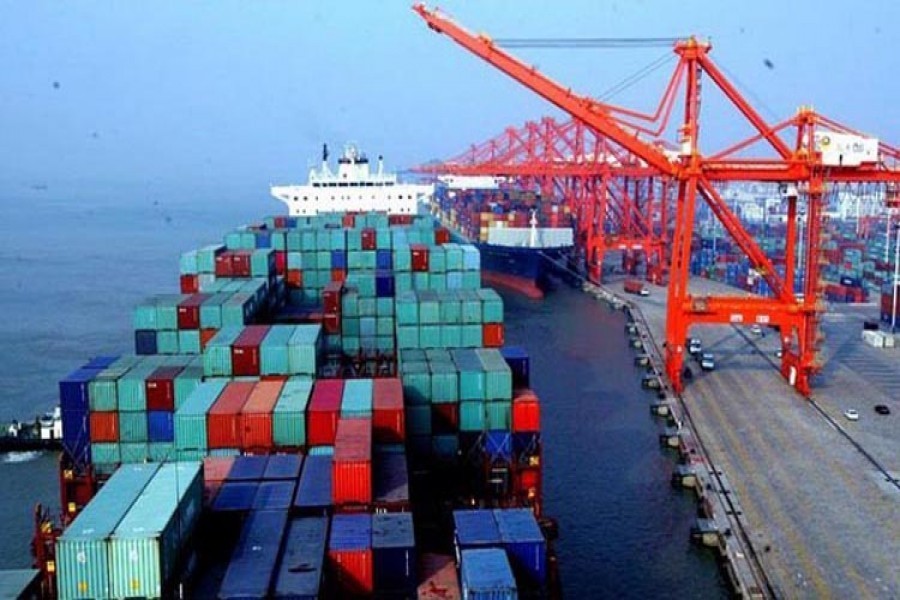Facing LDC graduation drawbacks for the current crisis, Bangladesh urges the UK to simplify its Generalised System of Preferences (GSP) system through amending its 'goods graduation' provision.
The government made the move for mitigating the evolving challenges, including the upset done by the unprecedented Covid-19 pandemic, on way to Bangladesh's exit from the world's poor-country club.
It has suggested offering LDC graduation in the Enhanced Framework and same Rules of Origin (ROO) provisions as the Least Developed Countries (LDCs) enjoy.
Bangladesh made the request in a position paper prepared by the commerce ministry on the United Kingdom's future tariffs and policies in relation to simplification of its draft GSP document.
The ministry already sent its position paper to the UK government, an official confirmed.
Currently, the UK is working to introduce a new GSP scheme next year, suiting the changed context.
Earlier, the UK had provided a questionnaire on its new GSP scheme and asked for position paper from Bangladesh, alongside other countries concerned, by 12 September 2021.
The London launched an eight-week public consultation on the new GSP documentation that ended on September 12.
"As newly graduating country Bangladesh has so many challenges like implementation of SDGs, environmental and social challenges, unprecedented COVID-19 pandemic challenges and, especially, Rohingha-refuge challenges," reads the position paper.
Dhaka has also recommended abolishing the product-graduation provision for newly graduating LDCs.
"Goods graduation is the suspension of preferential rates of customs duty on certain imports following a goods-graduation assessment. These imports are deemed highly competitive and no longer need preferences to compete on the UK market," according the UK questionnaire.
"Specially, threshold values associated with 47.2 per cent on apparel and clothing goods, 17.5 per cent on live plants and certain agriculture products and 57 per cent of all other goods are arbitrary in nature," it is stated in the position paper.
Dhaka has suggested reviewing the goods-graduation process and the threshold level of product graduation every 3 years.
"Some product-specific transformation provisions of the ROO might become challenging for LDCs due to shortage of skilled labour, efficient technology, adequate capital and technical know-how," the paper reads.
The British government should make liberal the product-specific ROO criteria so that it does not act to be technical barrier to trade for LDCs.
It also mentions that the UK government needs to simplify new GSP regime especially for LDCs.
The commerce ministry believes that the value of the UK GSP will get eroded/ reduced if the UK is unilaterally liberalizing its tariff regime.
The position paper recommends extending transition period further for newly graduated countries as the prevailing COVID-19 pandemic has staggered severe disruptions in the global trade and economic activities.
On the other hand, LDCs are facing dauntless challenges of environment.
According to officials, the new UK GSP scheme is keeping three criteria for the countries: LDC Framework, General Framework, and Enhanced Framework.
LDC Framework is for 47 countries that are classified by the United Nations as Least Developed Countries, and they will pay zero-rated tariff on all products bar arms and ammunition.
The low-income and lower-middle-income countries, as classified by the World Bank, are eligible to enjoy cut-down tariffs on two-thirds of their product lines under the General Framework.
Under the Enhanced Framework, low-income and lower-middle-income countries, which are classified as economically vulnerable and have satisfied requirements relating to the 27 international conventions, will see tariffs removed on two-thirds of their product lines.
The ministry viewed that the UK "should offer the graduation LDCs in the Enhanced Framework and same ROO provisions as the LDCs. If this cannot be granted for an indefinite period, a five-to-ten-year extended period (for keeping the same ROO applicable for LDCs) should be provided."
In the textile and clothing, LDCs currently enjoy single transformation ROO requirement while countries in Enhanced Framework have to follow a 'double transformation'. This will make very difficult for graduation LDCs to benefit from the Enhanced Framework," mentions the paper.
The ministry has suggested that "Either the same single transformation can be offered to the graduating LDCS/countries under Enhanced Framework or a simplified minimum value-added provision (e.g, of 30-35 per cent) be considered."
The UK is the third-largest destination for Bangladesh's exports after the USA and Germany.
The volume of Bangladesh's exports to the UK was over US$3.75 billion in the last fiscal year (FY) which was over 9.60 per cent of the country's total export turnover.
Sources said that Bangladesh would graduate from the LDC group in 2026, and the UK already assured that the country would continue to enjoy all the present facilities until 2029.
They said the UK government is considering providing greater tariff reductions for the goods that are covered by the enhanced and general frameworks, but are not subject to a full tariff reduction.
A senior official also said that Dhaka expressed hope to get an easy access under new GSP scheme for the export of Bangladeshi goods, especially apparel items, on the UK market.
"We have already requested the UK to amend the product-graduation system in the position paper," he added. Commerce secretary Tapan Kanti Ghosh could not be reached over the phone.
"We want that the UK continues its GSP facility for all types of Bangladeshi products but arms up to 2029, and it would be good if there would be no thresholds after that time," Distinguished Fellow at the Centre for Policy Dialogue (CPD) Professor Mustafizur Rahman told the FE.


